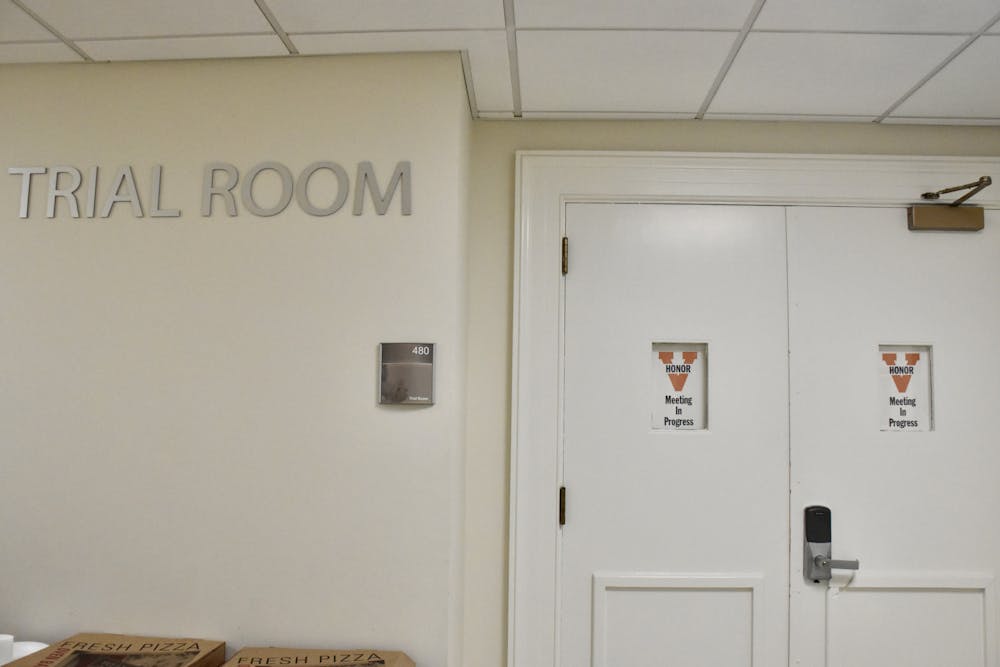The Honor Committee passed a new bylaw at their meeting Sunday that will increase the amount of time the Panel for Sanction is given to convene from seven days to 21 days following the submission of an Informed Retraction from seven to 21 days. The Committee also discussed whether accused students should be able to request specific demographic representation on the panel but tabled any decisions for a later meeting.
Carson Breus, vice chair for sanctions and third-year Commerce student, said the Panel time extension is meant to give all parties involved with an Honor case more time to deal with the logistics of the case. The bylaw passed with a majority in favor.
In cases that do not include a submission of an IR, the Panel for Sanction must convene within 72 hours. An IR allows a student who has committed an Honor offense to take responsibility and make amends.
The Committee last updated their bylaws June 25 when they officially codified the multi-sanction system, written in response to the student referendum passed in a University-wide election which eliminated single sanction. The Panel for Sanction is a panel composed of five Committee members that will consider the range of sanctions for an accused student, including but not limited to expulsion, suspension, education and amends.
Students are not currently able to make specific requests about the makeup of the panel under the bylaws. Adrian Mamaril, Graduate School of Arts and Sciences Rep., said that the option has value — especially for marginalized or minority students who may be overrepresented in Honor cases.
“As somebody who's worked with international students over the course of my four years as an undergrad here, I think that it's essential that the conversation [about demographic selection] just gets flushed out because [the] guideline could pop up on essential policies and procedures,” Mamaril said.
The Committee ultimately tabled the brainstorming session, and no formal vote on the topic was made.
Members discussed the possibility of working with public relations professionals to manage student perception of Honor following the recent significant changes to the sanction system. Third-year Law student Rep. Daniel Elliot explored the idea of hiring a public relations firm or an equivalent to help with negative student perception of Honor and examining what Honor means to the student body.
“If we’re concerned about [Honor’s] perception to the student body in a meaningful way, it makes sense to have people that do [PR professionally],” Elliot said. “It might be good to have them involved.”
The Committee said that the University Communications, the public relations department of the University, was a possible option. However, according to Hamza Aziz, Honor Committee chair and fourth-year College student, University Communications was not receptive to taking on Honor as a project.
William Hancock, member of the Policies & Procedures Committee and second-year College student, suggested using Honor educators for PR instead of outsourcing PR services for Honor. Honor educators are a subgroup of the Honor system made up of students that are dedicated to educating the community about Honor and their processes.
“[PR] is what all educators are focused on,” Hancock said. “I don’t think it’s a bad idea to explore [outsourcing PR], but I’d say definitely turn to educators first and ask us to do some of that work.”
The Committee entered into a closed session at 7:50 p.m. from which they did not return. The next Honor Committee meeting will be held Sunday at 7 p.m. in the Trial Room of Newcomb Hall.
CORRECTION: A previous version of this article stated that the Panel for Sanction is composed of seven randomly selected students and five Committee members that will vote on a student’s Honor case outcome. The Panel for Sanction is actually composed only of five Committee members who consider the range of sanctions for an accused student. The article has now been updated to reflect this correction.
A previous version of this article also stated that the Panel for Sanction would be able to convene from seven to to 21 days for all cases. Instead the Panel for Sanction will be able to convene up to 21 only in cases where an Informed Retraction has been filed.







